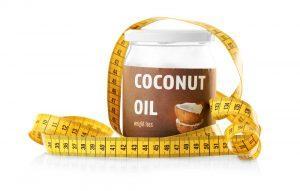From the blogs to your local grocery store aisles, coconut oil is everywhere. In recent years, health enthusiasts, nutritionists, and environmentally conscious individuals have praised the substance for a laundry list of reasons. Coconut oil uses range from the conventional, such as a cooking oil replacement, to the downright unusual. Can a single product really replace your moisturizer, shaving cream, and your cooking oil?
The only thing louder than the fans of coconut oil? Those who condemn it. Comparing coconut oil to “dangerous fats” like butter, beef fat and other saturated oils, you may find yourself questioning the hype. Especially since others say it can be used for, well, just about everything. As with most health trends, sifting through the noise can be a challenge. Citing articles that vaguely mention “a study” may not always be the most informed approach.
The Truth about Coconut Oil

Where and when to use coconut oil
As a Cooking Oil
Most medical weight loss advice encourages people to stay away from any excess fat or cholesterol. But when you replace low-quality cooking oils with calories in the form of sugar, white flour, or empty calories like soda, replacing bad with worse never works to anyone’s advantage. Besides, at you need at least some fat in order to absorb nutrients from food. In terms of calories from saturated fat, the stats may surprise you, especially when it comes to coconut oil:
Calories from Saturated Fat in Popular Cooking Oils
- Olive Oil= 14% of calories from saturated fat.
- Butter= 16% of calories from saturated fat.
- Coconut Oil= 84% of calories from saturated fat.
Not to mention, one tablespoon of coconut oil contains your entire day’s limit of saturated fat. (That’s 13 grams, according to The American Heart Association)
However, coconut oil differs from these other oils in that it contains medium-chain triglycerides (MCT’s). Some sources say that, despite the higher percentage of saturated fat, these MCT’s allow the fat to be processed differently in the body, compared to vegetable oils, dairy and fatty meats.
Consensus: just because it may not be directly damaging to your heart, does not make it heart healthy. Try getting your healthy fats from other sources such as olive oil, avocado, and nuts. But when given the choice between coconut oil and say, vegetable oil, try coconut oil in moderation.
As an alternative in Baking
Compared to lard, coconut oil certainly appears to be a healthier choice. While the saturated fat in coconut oil outweighs that of butter, the lower percentage of sodium, lack of dairy, and natural flavor may be an attractive option for those looking for a healthier choice.
That being said, low-sodium and dairy-free products have never been more accessible. What once required a trip to the health food store can now be found at your local supermarket. Do you really need coconut oil to receive the health benefits of the fruit? The large percentage of saturated fat just may make the attempt to lose weight a greater challenge.
To help fight a number of health conditions
If you look hard enough, Coconut oil can be attributed as a treatment for just about every common ailment. Sifting through personal experiences versus actual studies can be a bit of a challenge. But in more than a few cases, those personal experiences may have just a bit of truth in them.
Coconut oil contains lauric acid, (a medium chain fatty acid), found in cow, goat, and human breast milk. Lauric acid may help improve gut health while fighting pathogens like bacteria and fungi, while also slowing the fruition of viruses. It has also shown promise as a component in acne treatment. Coconut oil has also been connected to the slowing of inflammation– the cause of many food intolerances and digestive disorders. Over time, increased inflammation can lead to life-threatening diseases, such as cancer and heart disease.
You cannot deny coconut oil’s potential health benefits. What we do know about shows promise for some of the ailments that plague us most. The danger, however, comes in treating it like a miracle cure. A positive study does not imply that one should just start eating coconut oil by the spoonful. Simply, when it comes to coconut oil, you cannot expect significant results simply from its consumption.
But what about coconut oil outside the body?

As a Hair Mask
Many commercial hair products contain coconut byproducts, and for good reason. Coconut oil contains antioxidants and fatty acids essential for healthy hair. However, many commercial hair products contain additives, such as sulfates and parabens, which may damage your hair and scalp.
Simplify! Use coconut oil as a hair mask to give it a boost of shine, smoothness, and health. To create a coconut hair mask, run the jar of coconut oil under warm water. Add the oil to wet hair and twist into a bun. Let the oil sit in the hair for up to five minutes, rinse thoroughly and enjoy healthier, shinier locks!
As a Moisturizer
Replace your pricey lotion bottle with a jar of coconut oil. Swapping your daily moisturizer, under eye cream, and makeup remover will not only save you money, the results become more obvious. Not to mention, you cut down on your exposure to potentially irritating chemical additives!
As a Shaving Cream
Canned shaving cream can add up over time, sometimes to the point that you start abusing your hair conditioner to avoid buying another can. Alternatively, you can just pull a scoop of coconut oil from your jar. Just warm a small amount of oil into your hand, smooth it over wet skin, shave as you normally would, and rinse. You may notice slightly more moisturized skin. Not to mention the natural, light coconut scent the oil will leave behind.
What type of Coconut Oil Should I Use?

- Unrefined Organic- The best kind of coconut oil you can buy. This contains the highest antioxidant levels. This oil is created using a wet-milled fermentation process.
- Extra Virgin – Unlike olive oil, extra virgin coconut oil while good, isn’t the best. You will, however, find this to be the most commonly found coconut oil in stores. Created using a cold-pressed process, it contains fewer antioxidants than the unrefined organic variation.
- Refined or Fractionated Oil – This coconut oil is heated, bleached, and deodorized. The refining process removes the majority of the coconut oil benefits, including its taste and coconut smell.
When it comes to cutting down on fat in your diet, switching to coconut oil may not be the best choice available. But do not discount the remaining health benefits, inside and out, of this “superfood”. The nearly-infinite coconut oil uses may change your household, dietary and cooking routines!
Not sure where to start with your new diet? Need weight loss help? Apprehensive about the commitment a diet plan requires? Contact Physicians Weight Loss to learn more about medical weight loss and embark on your weight loss journey, today!

